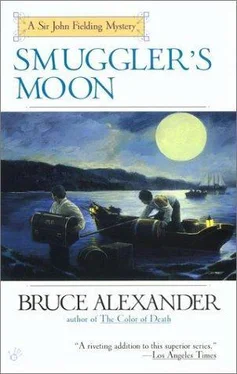Bruce Alexander - Smuggler's Moon
Здесь есть возможность читать онлайн «Bruce Alexander - Smuggler's Moon» весь текст электронной книги совершенно бесплатно (целиком полную версию без сокращений). В некоторых случаях можно слушать аудио, скачать через торрент в формате fb2 и присутствует краткое содержание. Жанр: Исторический детектив, на английском языке. Описание произведения, (предисловие) а так же отзывы посетителей доступны на портале библиотеки ЛибКат.
- Название:Smuggler's Moon
- Автор:
- Жанр:
- Год:неизвестен
- ISBN:нет данных
- Рейтинг книги:4 / 5. Голосов: 1
-
Избранное:Добавить в избранное
- Отзывы:
-
Ваша оценка:
- 80
- 1
- 2
- 3
- 4
- 5
Smuggler's Moon: краткое содержание, описание и аннотация
Предлагаем к чтению аннотацию, описание, краткое содержание или предисловие (зависит от того, что написал сам автор книги «Smuggler's Moon»). Если вы не нашли необходимую информацию о книге — напишите в комментариях, мы постараемся отыскать её.
Smuggler's Moon — читать онлайн бесплатно полную книгу (весь текст) целиком
Ниже представлен текст книги, разбитый по страницам. Система сохранения места последней прочитанной страницы, позволяет с удобством читать онлайн бесплатно книгу «Smuggler's Moon», без необходимости каждый раз заново искать на чём Вы остановились. Поставьте закладку, и сможете в любой момент перейти на страницу, на которой закончили чтение.
Интервал:
Закладка:
There was a ship offshore. I could see it plain enough. It had the appearance of a sloop but was probably what I had heard called a ”cutter” there in Deal. When it hove into view, someone aboard sent up a rocket from a flink pistol. And one who seemed to be in charge of the party on the beach lit a spout lantern and aimed it at the cutter, thus showing that they were ready on the beach to receive the landing party. It had been planned a full three days ago that when the boat from the cutter came, and the four men constituting the landing party were involved in beaching it, the constables were to emerge from their hiding place and rush the smugglers, threatening to shoot any who resisted. Mr. Perkins and I were upon the bluff to stop any that might escape the constables below.
It was a good enough plan and might have worked just as Dick Dickens and Mr. Sarton intended it to, but for one matter. There were too many of them and not enough of us. What was unknown was how many men would arrive in the boat and how well they would be armed. Mr. Perkins, newly appointed as a Deal constable, grumbled about this to me unceasingly and had cautioned me early on not to be surprised if he were to improvise a bit when the time came.
Well, the time had come. The boat was now visible, pushing through the channel which cut through the sandbar. There were but three in the boat: two oarsmen and a passenger. Presumably, there was also cargo of some sort aboard-though I had no idea what could be so small yet of such value that it would make worthwhile the voyage of a cutter across the Channel from France. Two men of the four who had arrived with the horses waded out to the boat.
“Jeremy!” he whispered urgently.
“Yes, Mr. Perkins?”
“Do you reckon you can take care of any who flee up this little hill?”
”You may be certain of it.”
“Remember to shoot to wound and not to kill. And now, if you’ll excuse me, I’m going to go a bit mad.”
What did he mean by that? I’d no idea until he jumped up from our safe cover, drew the cutlass from its sheath, and let out a scream the like of which had surely not been heard in England since the days when the wild Picts came down from the north to murder and pillage the poor Anglo-Saxons. Then did he begin the run down to the beach, continuing to emit terrifying shouts as he whirled the cutlass above his head like a Musselman in the throes of some murderous dementia.
I rose from our place upon the bluff that I might see him better-yet still better did I see those round the boat. The effect upon them of Mr. Perkins’s performance was like that of poor brutish creatures who stand in frozen awe when the lion attacks. Each of those who stood in the shallows now had in his hands a box of some dimension-the cargo. The horses, whose reins were held by one of the quartet, did not like those chilling screams of Mr. Perkins-no, not in the least; they stirred and pranced nervously and became altogether difficult to hold in check. Only the fourth of them managed to act: he drew from his belt a pistol and leveled it at Mr. Perkins; yet before he could fire, another pistol was fired at him-that of one of the constables; he staggered, wounded.
“Drop your weapons! This be the law!”
Then was all set in motion at once: the horses reared; he who held the reins kept tight hold, yet was thrown to the ground and dragged a bit in the sand; one of the oarsmen drew a pistol and attempted to return fire at the constables, but the powder flashed, fizzled, and failed to fire; the second oarsman and the passenger jumped into the water and began pushing their boat back out to sea in a most desperate manner; the two cargo handlers dropped the boxes they had taken from the boat and ran in opposing directions. So was it when Mr. Perkins arrived, and he was still whirling the cutlass above him as if he meant to lop off a head or two.
So intently was I watching the scene below on the beach that I nearly failed to notice that one of the cargo men had circled round and started up the bluff. He had not yet noticed me, because I was partly hidden by the high grass of the hummock and had not moved for a minute or more. It was now time to move, however. I knew I must head him off ere he reached the top of the bluff, and I lose him completely among the houses and the winding streets at this edge of the town. I ran to intercept him.
He was a big man, half again as large as I, but he lumbered unsteadily up the little hill in such a way that I knew I should have no difficulty in overtaking him. But then what? Short of shooting him in the leg, what could be done to stop him? He had glimpsed my approach, so there could be no question of catching him by surprise-and so I simply stopped. Yes, stopped and drew from its sheath the cutlass I had been given, and from its holster I took one of the pistols. With the sword in my right hand and the pistol in my left, I resumed my run, and in seconds I caught the big fellow up.
“Halt,” said I.
Yet he did not halt; he kept straining up the bluff, his feet slipping in the dry sand, so that he found it near impossible to make any upward progress.
“Halt,” said I again.
To no avail. He pumped his legs still more vigorously, and so I gave him a swift jab in the buttocks with the point of the sword. He let out a proper scream. I knew that I could not have hurt him quite so much as that. It must have been that he was taken by surprise.
“Would you like another?” I shouted at him.
His legs at last had halted. He turned round, and I saw in his wild eyes an unspoken threat. He seemed to be weighing his chances. I raised the point of the cutlass so that it was less than a foot from his sagging belly. I brought up the pistol that he might reckon it also in the odds against escape.
“Go ahead,” said I in a suitably nasty tone, ”and if you do, I’ll skewer you on the sword and finish you off with the pistol. And do not suppose I lack the stomach for it.”
I should like to think, reader, that it was my threatening tone persuaded him-and perhaps it was-but I believe it more likely that the poor fellow, panting with exhaustion, was simply too tired from the efforts he had made thus far, to consider any course but surrender.
Reluctantly, he nodded, and I stepped aside and pointed the direction with the sword.
“This way,” said I. ”Down there with the rest.”
And down the bluff we went. There was nothing more for me to say to him, and so I said nothing. Upon our arrival, I found the rest had been disarmed and were in a similar state of sullen compliance. One of the constables had with him a considerable length of rope and was occupied in binding the prisoners each to each; the second held them where they stood with pistol and cutlass. Mr. Perkins brought the horse-handler back to his fellows, urging him on from the saddle with the flat of his sword. I noted that the wounded man had had his shoulder bound after a fashion; the bleeding had, in any case, been stanched with a tourniquet.
With my prisoner added to their number, we had taken four. Not a bad haul except that three (the second cargo-handler and the two in the boat) had escaped our trap. Still, none of our fellows had been so much as scratched. We could count this a certain victory.
In all, it took about ten minutes to attend to matters before marching the prisoners off to the inn where they would spend the night. We marched them up toward the bluff, with the constables at the head of the column and Mr. Perkins and I bringing up the rear, leading the two horses. Along the way, he mentioned a matter in which I had considerable interest, as did Sir John later on.
“You know, Jeremy,” said he, ”something struck me as strange whilst I was putting on my show back there.”
“Oh? And what was that?”
Читать дальшеИнтервал:
Закладка:
Похожие книги на «Smuggler's Moon»
Представляем Вашему вниманию похожие книги на «Smuggler's Moon» списком для выбора. Мы отобрали схожую по названию и смыслу литературу в надежде предоставить читателям больше вариантов отыскать новые, интересные, ещё непрочитанные произведения.
Обсуждение, отзывы о книге «Smuggler's Moon» и просто собственные мнения читателей. Оставьте ваши комментарии, напишите, что Вы думаете о произведении, его смысле или главных героях. Укажите что конкретно понравилось, а что нет, и почему Вы так считаете.












